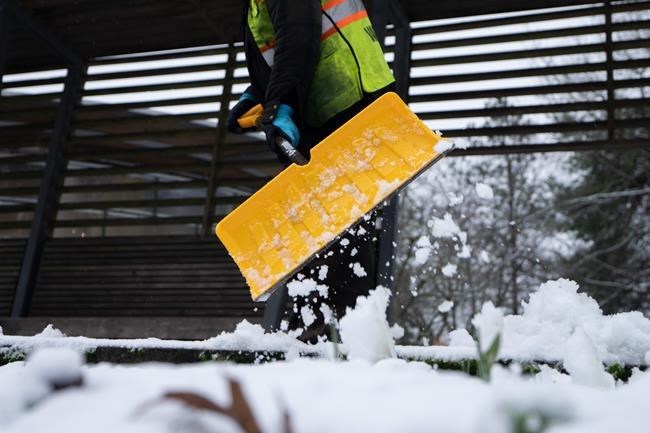VANCOUVER — An arctic stranglehold on much of Western Canada is loosening on all but northern Alberta, while a Pacific low-pressure system brings snow to much of British Columbia.
Environment Canada has lifted most of the extreme cold warnings in the Prairies, but says the long period of bitterly cold temperatures will continue in Alberta's north with wind chill values near -40 C.
The weather agency has also issued snowfall warnings for most of the lower two-thirds of British Columbia, with 15 to 20 centimetres of snow predicted for Metro Vancouver and Greater Victoria.
The City of Vancouver is warning residents to avoid non-essential travel as a storm bears down Tuesday night, possibly easing by late Wednesday.
B.C.'s Ministry of Transportation has issued travel advisories for a large number of major highways in Metro Vancouver, including Highway 1 from Vancouver to Hope, the Lougheed Highway from Port Coquitlam to Maple Ridge, Highway 99 from Richmond to the U.S. border, the Pacific Highway in Surrey, Highway 91 from Richmond to Delta and Highway 17 from Tsawwassen to Delta.
The ministry says people shouldn't drive unless their vehicles are properly equipped with winter tires.
Further east,Toronto's Pearson Airport issued a statement on social media saying weather systems across Canada may impact flights into and out of the city, and some airlines have cancelled flights into Europe, especially Germany, due to weather systems there.
Southern Ontario is dealing with a handful of snow squall and extreme cold warnings, watches and advisories, and the Gaspé Peninsula in Quebec is under a winter storm warning where people are asked to postpone non-essential travel.
In Atlantic Canada, most of New Brunswick is under a mix of snowfall, winter storm and freezing rain forecasts, and Nova Scotia as well as Newfoundland and Labrador face a patchwork of rainfall, winter storm and wind notifications with gusts up to 140 kilometres an hour possible in some areas.
The City of Vancouver is asking residents to stay off the streets to allow crews to clear the roads when the snow begins to fall.
The city says crews are pre-treating priority routes, including bridges and streets around hospitals, but warned that residential roads are not included in treatment plans.
Residents are asked to have shovels and de-icing materials ready, and failure to clear their sidewalks within 24 hours of snowfall may result in fines up to $750.
This report by The Canadian Press was first published Jan. 16, 2024.
The Canadian Press



